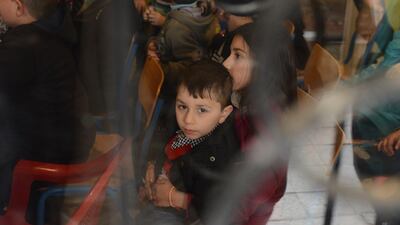AMMAN // Abu Nabil had walked 12 kilometres barefoot in the rain through the Syria-Jordan crossing, with his daughter carried on his back.
He and his wife thought Maria was dead – the 10-year-old’s blood had drenched the back of his shirt. His wife said they should bury her so she would be laid to rest in Syria.
Abu Nabil, 52, was a lawyer working for free to help displaced Syrians in Damascus. He was at work when his home was bombed in an assassination attempt by Bashar Al Assad’s government.
Maria was at home.
“They found her in the rubble. They thought she was dead,” Abu Nabil said.
“After I found her in the hospital a friend, a doctor, told me that they were coming to kill me and my daughter, and they helped me escape.
“I kept asking if she’s dead as we were running away. They kept telling me to keep running behind us to escape.”
Abu Nabil and his family now live in the Hashemi-Shimali area of Amman along with hundreds of thousands of other refugees from Iraq and Syria.
He volunteers at the Collateral Repair Project, which runs community programmes and provides emergency assistance in refugee neighbourhoods. The organisation was visited this week by a UAE educational non-profit group, Beacon of Hope UAE, founded by Sheikha Shamma bint Sultan.
“I’m not part of a revolution, I have never held a gun. I’m a lawyer. They wanted my daughter dead so that no one would know her story and influence public opinion of the regime,” Abu Nabil said.
The first taxi driver Abu Nabil saw, on the night he and his family crossed into Jordan, refused to take the family. The second only agreed to take them after Abu Nabil threatened to blame his daughter’s injury on the driver running her over.
They were driven to Daraa and made the rest of the journey on foot. The Jordanian army took them in and his daughter was treated. She now suffers severe post-traumatic stress disorder.
His son, who was studying journalism in Lebanon in 2011, is now in hiding after Hizbollah were given orders to assassinate him, said Abu Nabil.
“I want to die. If I could die, I would. But I can’t – I want to make sure my family is OK. I want to see my son, I haven’t seen him in so long,” he said.
Most refugees in Jordan are not allowed to work and depend on aid programmes to sustain their families.
The Collateral Repair Project has provided assistance and emergency relief to more than 5,000 refugee families since 2006. More than 80 per cent of Syrian refugees in Jordan live in urban areas and are not provided the benefits they would receive in refugee camps, such as school, transport and medicine.
“People hear about us through word of mouth, after they have spent a few months in Jordan. After they have run out of money, the families come to our door when they don’t know where their next meal is,” said Amanda Lane, executive director of the project.
“People think that if they can afford an apartment, they are fine ... The reality is they are struggling, but they want to live in a humane way – in an urban environment that somewhat approximates the life they left so abruptly.”
The organisation tries to help refugees who are put on waiting lists by larger refugee relief groups. Refugees can wait months or years before being given assistance, as was the case with Ibrahim Al Aboosi, an Iraqi who has spent the last 10 of his 17 years as a refugee.
“We left Baghdad in 2007 because my father was kidnapped by militias for no real reason. They did it for the money despite the fact that we gave out a ransom. They wanted to kill him,” Ibrahim said, using fluent English he learnt from watching movies.
His father escaped by luck and the family were able to gather their belongings and flee to Syria, where they had a decent life for five years. His father found work as a mechanic and Ibrahim enrolled in one of the public schools.
However, after the conflict in Syria began in 2011, the family found themselves fleeing again, having just settled. They went to Jordan as refugees, meaning Ibrahim’s father could not work and, in ninth grade, Ibrahim had to drop out of school.
“My family of five slept in a small apartment on the floor on five-centimetre thick mats. We were living on around 200 Jordanian dinars a month and that moment was the absolute worst,” said Ibrahim.
“The only saving grace was that it was Ramadan, so the hunger we felt was attributed to fasting and not the fact that we had no money for food.”
They came to the Collateral Repair Project hungry and were given support, food vouchers and a community.
“There was really no future for me, you see – no hope. But under the guidance of Amanda I applied to Kings Academy, one of the best if not the best school in Amman, and I was accepted,” he said.
“Now I have a future. I can see one. I just have to help my family have the same future.”
Ibrahim will still have to find funding to attend the boarding school, which costs more than US$40,000 a year.
To help Ibrahim and other refugees, donations can be made on the organisation's website at collateralrepairproject.org. A donation of $100 (Dh367) can pay for a year of schooling for many refugee children.
nalwasmi@thenational.ae

